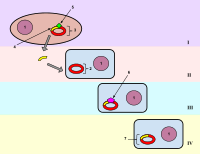
Photo from wikipedia
Bacillus subtilis cells can mount a number of responses to nutritional deprivation but ultimately either form dormant spores or enter a metabolically quiescent state. In a recent article (mBio 10:e01414-19,… Click to show full abstract
Bacillus subtilis cells can mount a number of responses to nutritional deprivation but ultimately either form dormant spores or enter a metabolically quiescent state. In a recent article (mBio 10:e01414-19, https://doi.org/10.1128/mBio.01414-19, 2019), R. Hashuel and S. ABSTRACT Bacillus subtilis cells can mount a number of responses to nutritional deprivation but ultimately either form dormant spores or enter a metabolically quiescent state. In a recent article (mBio 10:e01414-19, https://doi.org/10.1128/mBio.01414-19, 2019), R. Hashuel and S. Ben-Yehuda report on a novel means by which nutrient-starved B. subtilis cells escape from aging (days-old) colonies by accumulating mutations enabling them to continue growth under nutrient-limited conditions. They postulate that such a strategy may be a major factor determining the dynamics of bacterial populations in natural environments.
Journal Title: mBio
Year Published: 2019
Link to full text (if available)
Share on Social Media: Sign Up to like & get
recommendations!